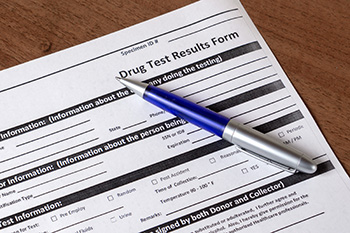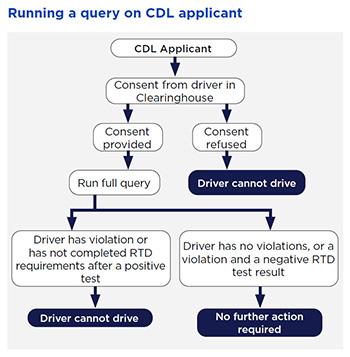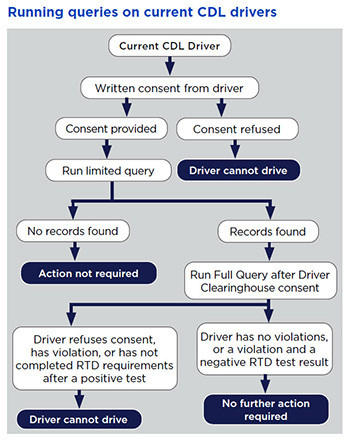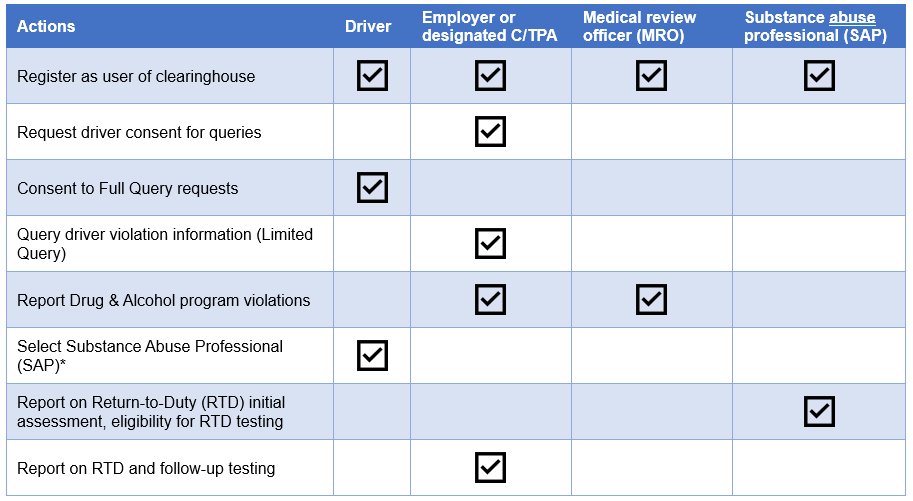Drug and alcohol clearinghouse

The FMCSA Drug and Alcohol Clearinghouse assists organizations by identifying CDL drivers prohibited from operating Commercial Motor Vehicles because of past positive drug and alcohol testing results.
When hiring CDL drivers, background inquiries are required to determine if the applicant tested positive to a drug or alcohol test or refused a test. In the past this was accomplished by contacting previous employers (§391.23 and §40.25).
Often the previous employer did not respond to the request, so the employer did not know if the applicant ever tested positive or refused a test. To help address this problem, the Federal Motor Carrier Safety Administration (FMCSA) established the CDL Drug and Alcohol Clearinghouse (Clearinghouse), which went into effect on January 6, 2020.
The Clearinghouse allows employers, state driver licensing agencies and law enforcement officials to identify in real-time a CDL driver who has violated the drug & alcohol testing program requirements. The Clearinghouse will also indicate if a driver who tested positive has completed the required return-to-duty (RTD) process.
Employers must register in order to utilize the Clearinghouse. The Clearinghouse regulation, 49 CFR Part 382 Subpart G, requires queries at hire, and then annually, on all CDL drivers.
| On 11/18/2024 a CDL holder who is in Prohibited Status in the Clearinghouse will have their CDL downgraded to a standard license and therefore cannot operate a CDL required vehicle. |

When a driver has a positive test result or refuses to submit to a test, those results are recorded in the Clearinghouse by either the Medical Review Officer (MRO) or the employer.
If a driver has a positive drug and / or alcohol test, and wants to return to driving, they must meet with a Substance Abuse Professional (SAP). The driver can select an SAP within the Clearinghouse. The SAP will report on the driver’s Return-to-Duty initial assessment and eligibility status for Return-to-Duty (RTD) testing within the Clearinghouse.
Employers can designate a consortium / third-party administrator (C / TPA) in the Clearinghouse to assist with meeting their query and violation reporting requirements. An individual that employs him / herself as a driver (owner-operator) must select a C / TPA to perform these duties.
There are two different types of queries the employer will use: limited query and full query. A Limited Query allows you to determine if a currently employed driver’s Clearinghouse record has any information about resolved or unresolved drug and alcohol program violations but does not release any specific violation information. Limited queries require a general driver consent obtained outside the Clearinghouse. The general consent may be effective for more than one year. However,
it must specify the timeframe the driver is providing consent for. Limited queries are required to be performed annually on all CDL drivers employed by the employer based upon calendar year or hire date. If information is identified about a drug and alcohol program violation during the limited query, the employer is then required to run a full query which provides specific information.
A Full Query is performed when a drug and alcohol violation was identified during a limited query or during pre-employment screening of a new CDL driver. Full queries require driver consent, granted electronically by the driver registering in the Clearinghouse. If a CDL driver does not provide consent for a full query the CDL driver may not drive a Commercial Motor Vehicle (CMV) as defined by the FMCSA.
A flat per query fee ($1.25) is charged to anyone that runs a query within the clearinghouse. Query bundle plans can be purchased, and the bundle should be large enough to cover the number of drivers you currently employ. Queries never expire, and additional query plans can be purchased as needed. If you run a limited query and get a hit, requiring you to run a full query, you are only charged for one query.

Violation information is retained in the Clearinghouse for five years or until the Return-to-Duty process is successfully completed, whichever is later. For example, if a driver received a failed drug/alcohol test and did not go through a Substance Abuse Professional (SAP), stopped driving a CMV, and worked in an office setting for 10 years, that driver’s Clearinghouse record will still show the Return-to-Duty as incomplete.
As an employer you must report the following into the Clearinghouse by the end of the third business day:
- Alcohol test result of .04 or greater or positive drug test
- Driver’s refusal to submit to a drug or alcohol test
- Negative return to duty test
- Date a driver successfully completed all follow-up tests as ordered by the SAP
As an employer, it is important that your drug and alcohol testing policy contains details about the Clearinghouse, including procedures for running limited and full queries. Also communicate with your drivers to ensure they understand the Clearinghouse and are registered in the event a full query is required.
The FMCSA has a comprehensive website with educational materials for employers and drivers. Click on the “Learn” icon for specific information for drivers, employers, and owner-operators.
Click for a sample FMCSA consent form.
Consequences of failing a drug or alcohol test should be clearly outlined in your drug and alcohol policy. If a decision is made to keep a driver that has failed a drug or alcohol test, they must be placed in a non-driving position while they complete the mandated RTD process as outlined by a SAP. The RTW process includes a treatment plan, a negative drug and/or alcohol test, and six unannounced follow-up tests during the next 12 months.
If an employer hires a driver who has tested positive in the past and did not complete the RTD process, the new employer will be required to ensure the RTD process is completed before allowing the employee to operate a CMV.
Below is a snapshot as to who would use the Drug and Alcohol Clearinghouse and how it would be used.

*A driver would only need to select a SAP if they have a drug or alcohol violation.
